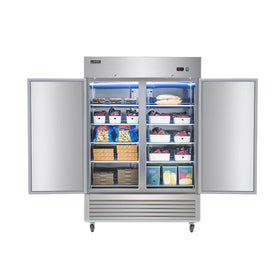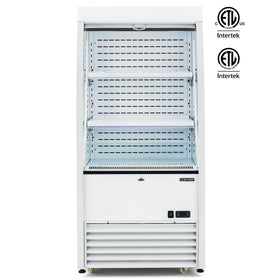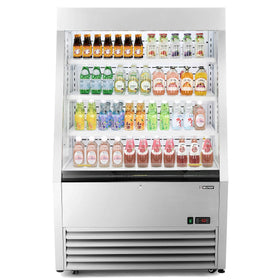UL certification does not automatically last forever. Even upon completion of the UL certification process, UL continues to conduct random inspections, and it can suspend or withdraw your UL certification if you fail to uphold the standards that were established upon certification.
However, the good news is that preserving your “UL-certified” is quite easy. As long as you know what standards you are required to uphold and what actions/ inactions would cause your certification to be revoked or suspended, all it takes is some diligence and proactive thinking.
We are taking you through what standards UL requires for commercial refrigerators, how you can lose your certification, and some proactive steps you need to take to ensure that your refrigerator remains certified for safety.
What Types of UL Certification Apply to Commercial Refrigerators?
There are many types of UL certification, and not all of them apply to commercial refrigerators. For commercial refrigeration units, UL tests and approves for electrical safety, fire prevention, sanitary construction, energy efficiency, and operational reliability.
- Electrical safety
- Fire prevention
- Sanitary construction
- Energy efficiency
-
Operational reliability
A UL-certified commercial refrigerator, therefore, meets strict industry guidelines in the above categories. When your equipment is UL-certified, you're telling your customers, employees, and inspectors that safety is a priority in your kitchen.
What Standards Must Be Maintained for UL Certification?
There are many benefits of using a UL-certified commercial refrigerator, but the certification also comes with responsibilities. UL certification represents a set of standards your refrigerator must continue to meet even after the certification has been issued.
Here are the main benchmarks:
1. UL 471: Commercial Refrigerators and Freezers
The UL 471 standard covers most commercial refrigeration appliances, and it ensures that:
- All electrical components are properly grounded and insulated
- Door gaskets are well-sealed to maintain cold temperatures
- Materials are non-toxic, corrosion-resistant, and safe for food environments
-
Units are constructed to resist fire and electrical hazards
2. NSF 7: Food Equipment Sanitation
The NSF 7 standards often go hand-in-hand with UL certification. NSF 7 ensures that:
- Surfaces in contact with food are smooth, non-absorbent, and easy to clean
- The unit consistently maintains food-safe temperatures
- The interior design minimizes places where dirt or bacteria can hide
3. UL 1995: Heating and Cooling Equipment
UL 1995 standards apply to units that have additional HVAC or dual-function features. It covers:
- Safe integration of heating and cooling components
- Structural integrity during combined operation
4. Energy Standards (DOE, ENERGY STAR)
Some UL certifications are also tied to energy compliance standards. These ensure your equipment operates efficiently and doesn’t waste power, contributing to lower utility bills and environmental responsibility.
What Can Cause Your UL Certification to be Revoked or Suspended?
Certain mistakes or oversights will result in your commercial refrigerator being classified and considered as no longer compliant with UL standards. In that case, the UL certification is suspended or cancelled.
Here are some common scenarios:
1. You Make Unauthorized Modifications
Let’s say your unit breaks down, and you or a technician installs a replacement part. If that part isn’t UL-listed, you’ve just compromised the unit's integrity. This may include rather “simple” modifications like:
- Installing a fan motor that’s not rated for commercial use
- Swapping control boards with generic alternatives
- Retrofitting with lighting systems not meant for that model
Once any of these modifications are made, your equipment may no longer meet the UL safety benchmarks, and that certification could be void.
2. It is Neglected and/or Damaged
You cannot have your commercial refrigerator UL certified and then proceed to completely neglect it and/or misuse it to the point of damage. UL certification depends on the equipment remaining in a safe, functional condition.
Here are some signs that your refrigerator is neglected/damaged, which are a threat to UL certification:
- Frayed wiring
- Broken door seals
- Damaged insulation
- Rust or corrosion
If a health or fire inspector sees these issues, they may flag your equipment as unsafe. They are easily overlooked, but can all turn a safe appliance into a hazard.
3. Improper Use of the Equipment
Certain kinds of items do not belong in a commercial refrigerator, especially one that is being used in a commercial kitchen. Also, commercial refrigerators, like all refrigerators, have a limit to how much they can store at a time.
Using your fridge for something it wasn’t designed for is a fast way to violate UL standards.
Any of these wrong/improper uses of a commercial refrigerator can result in the cancellation of your UL certification:
- Overloading the shelves beyond rated capacity
- Using it to store flammable chemicals
- Running it with doors open for long periods
This misuse can lead to overheating, inefficient performance, and even fire risk.
4. Failed Inspections or Reporting
Inspection of equipment is not always done by Underwriters Laboratories itself. Sometimes, UL or other regulatory bodies conduct inspections or receive reports from third parties (e.g., insurance agents, safety inspectors).
If your unit fails a safety check or if evidence suggests it’s been compromised, UL may revoke the listing.
5. The Certification Labels are Tampered With
Never remove, damage, or try to replace a UL certification label. Doing so not only voids the certification but may also violate laws around product labeling.
How to Maintain UL Certification: A Restaurant Owner's Checklist
Keeping your UL-certified status is completely doable. With a little diligence, you can prevent your UL certification status from being revoked and continue serving your customers with safety and assurance. Here are 5 easy steps you can take to preserve your UL certification:
1. Use Only UL-Approved Replacement Parts
When repairs are needed, insist on components that are UL-listed and approved by your refrigerator's manufacturer. Don’t let your technician install "universal" parts without verifying their compliance.
Always check:
- Model numbers
- Certification labels
- Compatibility with your unit
2. Follow the Manufacturer's Maintenance Schedule
Most commercial fridges come with a maintenance checklist. Follow it! Common tasks include:
- Cleaning condenser coils
- Checking door gaskets
- Monitoring internal temperatures
Keep a log of all maintenance and repairs. This documentation can be valuable in inspections.
3. Schedule Professional Inspections
At least annually, have your refrigeration units inspected by a licensed technician. Make UL compliance part of your checklist and proactively schedule professional inspections. Catching small issues early prevents bigger (and costlier) problems later.
4. Preserve Certification Labels
Treat your UL sticker like a passport. Don’t remove it, don’t write on it, and don’t let it get damaged. If it wears off or becomes unreadable, contact the manufacturer to get a replacement.
5. Avoid DIY Fixes and Unauthorized Retrofits
No matter how handy you are, don’t attempt electrical or mechanical repairs yourself. DIY solutions can compromise UL safety ratings. Always work with certified professionals.
6. Train Staff on Proper Use
Employee misuse is a leading cause of equipment damage. Make sure your staff knows how to:
- Load the fridge without overstuffing it
- Keep doors closed when not in use
- Clean up spills promptly
Post simple, clear guidelines near the unit to reinforce good habits.
7. Verify Certification When Buying New Equipment
When purchasing a new fridge, always ask: "Is this UL-certified?" Ask for documentation. You can even look up UL listings online to verify that what you’re buying meets current standards.
You might also want to avoid these common UL certification myths, as they can lead you in the wrong direction.
Final Thoughts: Make UL Compliance Part of Your Business Culture
UL certification isn't just a formality. It's your kitchen's safety seal. It's peace of mind. It's something that protects your business, your team, and your customers.
By understanding what UL certification is and committing to regular maintenance, staff training, and proper usage, you can easily protect your equipment and your business reputation.
Consider making UL compliance part of your standard operating procedures. In an industry where safety and reliability are everything, there are many risks associated with a non-certified refrigerator.
Stay informed. Stay compliant.










